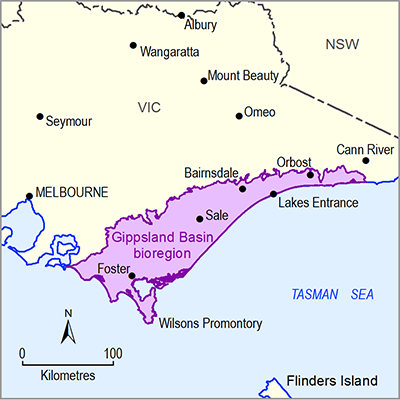This product presents information about the water‑dependent asset register developed for the Gippsland Basin bioregion. The name of the dated snapshot of the asset register this description refers to is ‘Water-dependent asset register and asset list for Gippsland Basin bioregion on 18 September 2015’ (available at Doody et al., 2015). The point-of-truth version of the asset register that this snapshot was extracted from resides in the asset database (Bioregional Assessment Programme, Dataset 1). The asset database and the water-dependent asset register can be updated so a more current version might be available at http://data.bioregionalassessments.gov.au/product/GIP/GIP/1.3.
Development of the register used methods and processes defined and outlined in the companion submethodology M02 (as listed in Table 1) for compiling water‑dependent assets (Mount et al., 2015); their specific application to the Gippsland Basin bioregion is described in the following sections.
An asset is an entity having value to the community and, for bioregional assessment (BA) purposes, is associated with a bioregion or subregion. Technically, an asset is a store of value and may be managed and/or used to maintain and/or produce further value. Each asset will have many values associated with it and they can be measured from a range of perspectives; for example, the values of a wetland can be measured from ecological, sociocultural and economic perspectives. A bioregion is a geographic land area within which coal seam gas (CSG) and/or coal mining developments are, or could, take place and for which BAs are conducted. A subregion is an identified area wholly contained within a bioregion.
A water‑dependent asset has a particular meaning for BAs; it is an asset potentially impacted, either positively or negatively, by changes in the groundwater and/or surface water regime due to coal resource development. Some assets are solely dependent on incident rainfall and will not be considered as water dependent if evidence does not support a linkage to groundwater or surface water.
The water‑dependent asset register is a simple and authoritative listing of the assets within the preliminary assessment extent (PAE) (discussed in Section 1.3. 1.3) that are potentially subject to water-related impacts. A PAE is the geographic area associated with a bioregion or subregion in which the potential water-related impact of coal resource development on assets is assessed. The compiling of the asset register is the first step to identifying and analysing potentially impacted assets, which is the goal of the overall BA.
The asset source data are compiled into an asset database, including the geographic location, which are designated as elements (individual spatial features – points, lines and polygons e.g. components of a larger system) and assets (combinations of one or more elements). During the compilation process, assets are classified into three groups: (i) ecological, (ii) economic and (iii) sociocultural. Many assets are obtained from state and national databases and an important group of assets is compiled by natural resource management organisations (NRMs) via the BA-purpose-built Water Asset Information Tool (WAIT) database. The Office of Water Science liaised with Indigenous knowledge holders about Indigenous sociocultural water-dependent assets (further discussed in Section 1.3.4.1).
The asset list is created through selection of assets in the asset database that occur within the PAE. The assets in the asset list that pass the BA water-dependency test are then 'registered' in the water‑dependent asset register. A preliminary version of the asset register is presented to experts and organisations with local knowledge at organised workshops. Feedback is sought about whether the asset register is complete and correct; appropriate amendments are then made. It is at this stage – when assets have been selected using the PAE and the amended water‑dependent assets have been recorded in the database – that the water‑dependent asset register is complete for the purposes of producing product 1.3. Note, however, that the addition of new assets to the asset database, or a review of the status of existing assets in the database will mean that the asset register may be updated. As this has implications for other BA components, any updates must be documented. The product 1.3 will not be updated or republished as part of bioregional assessments but an updated version of the asset register (derived from the asset database) may be published at the same time as other products, for example, those associated with Component 3: Impact analysis (Figure 1 and Figure 2).
Following development of the asset register, the connection of the registered assets to coal resource development is assessed using ‘materiality’ tests and, if potentially subject to water-related impacts, assigned receptors (after Barrett et al., 2013). A receptor is a point in the landscape where water-related impacts on assets are measured and/or estimated. The approach to assigning receptors and impact variables to water‑dependent assets is described in the companion submethodology M03 (as listed in Table 1) for assigning receptors to water-dependent assets (O’Grady et al., 2015).

